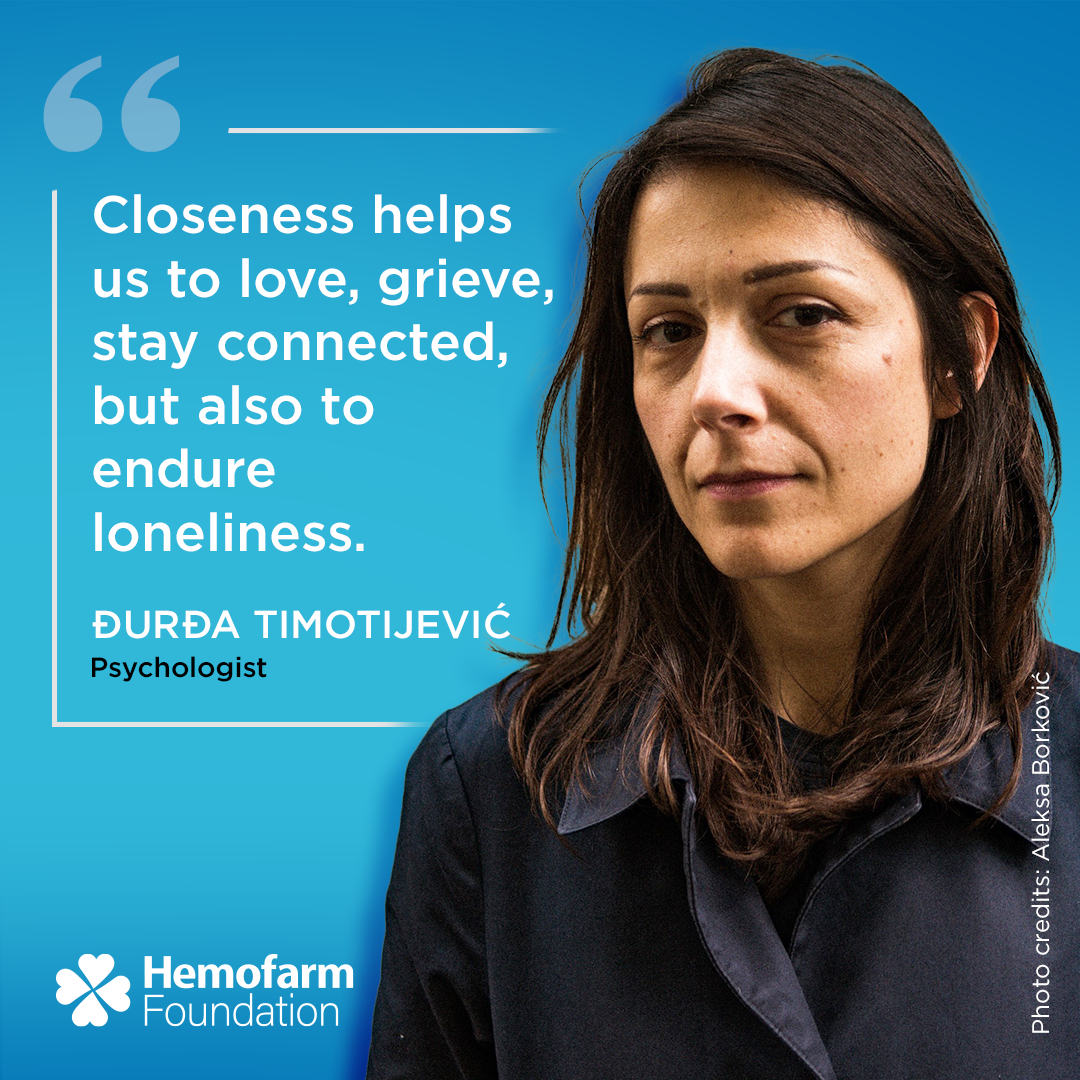
09/02/2024
Closeness helps us to love, grieve, stay connected, but also to endure loneliness
Đurđa Timotijević, Psychologist
Closeness helps us to love, grieve, stay connected, but also to endure loneliness
What did John Lennon exactly mean by sending the message that ‘Love is all you need’ via first multinational satellite programme in the 1970s? Taking into account his anti-war engagement and other forms of activism, John knew very well that such love required a minimum of conditions to be provided. We need to live in peace, and not war, we need have the right to clean air and potable water, to live a life above the limit of poverty, a life without discrimination, to have healthcare worthy of humans, the right to freedom of speech, education, information, protection of animal rights… it’s a long list.
Nevertheless, his message – “All You Need is Love”, is in accordance with the hypothesis that has been being confirmed for decades, by both psychological and psychoanalyst theories, as well as clinical research and practice – specifically, that emotional bond with other people, namely love, is most important for mental health and the capacity for happiness as such. This is a universal trait of all people, and probably of some animals as well.
Starting with the post-Freudian psychoanalysis of the 1920s, the relationship with the important other, real or imaginary, becomes the central determinant of structuralisation and development of personality in psychoanalytical theory and it ceases to be secondary to instincts (sexual drive, or eating). In other words, the quality of emotional bond with the mother (or a person who performs that function in raising of a child) in the earliest age is our starting point in understanding the functioning of an adult, in both – the healthy aspects, and those that fall under the domain of pathology. The very development of the symbolic function, namely, the development of thinking and the capacity for mentalisation – understanding and imagining one’s own emotional states and emotional states of others and related behaviours and the capacity to differentiate between the inner and outer reality depends on our early experience of being in this close relationship. Our relationships with other important figures in our life, too, depend on the quality of that, earliest relationship, as well as the capacity for regulation of emotions, the capacity for feeling closeness to other people, but also the capacity to be alone. Some authors point out the importance of early affective attachment for the development of the capacity to care for others and about others and to contribute to the community, which are considered to be the basis for development of morals in an adult person. According to Winnicott, the earliest experience of maternal love determines whether we will become “persons who live and feel that life is worth living… or persons who cannot live creatively and who doubt the value of living”. It is important to emphasise here that, speaking about the importance of a close relationship with our mothers at the earliest age, we are not speaking about an ideal relationship or a perfect mother, but about sufficiently good maternity, by which we mean that the mother was for the most part capable of recognising the baby’s needs and providing an adequate and timely response to them most of the time. It is also important to note that, if that was not the case, this does not mean that our mothers did not love us, but that for some other reasons they were not capable of being more responsive at the time.
Although our need for closeness, that is, for an emotional attachment is most obvious during the childhood, it remains our need for as long as we live. John Bowlby, the creator of the affective theory of attachment, probably the most popular theory in this domain, points out the need for closeness in the adult age is in harmony with maturity and mental health and that behaviours of attachment are most transparent in the moments when we are scared, tired, or sick, because this is when we ask the people close to us to offer us what we do not seem to be able to offer to ourselves – consolation and safety. Development does not mean moving from emotional attachment to absence of attachment, but rather to more mature forms of attachment. Supporting the thesis that closeness is important in the adult age are the results of a Harvard University research on happiness, the longest longitudinal study (over 80 years of monitoring the subjects) conducted over an entire human lifespan (Harvard Study of Adult Development. This study has demonstrated that a good emotional relationship is most important for our subjective experience of happiness. So, it is not about money, not about career success, not about healthy lifestyles, exercise, and fibre-rich nutrition, but about love with another person.
For the end of this brief account on the importance of love and closeness, I would like to remind you that the accumulated psychological and psychotherapeutic knowledge testifies to the fact that emotional injuries caused at an early age and their consequences are not determining and irreparable. On the contrary, it is real love that “makes us better” indeed. Translated into a somewhat more professional language, the real love would mean safe affective attachment, meaning relationships in which we feel safe and safely attached, and then again free enough to be separated and distanced, without fear of punishment or fear that the relationship would deteriorate. Such relationships and such love could be and for the most part are corrective experiences in our lives, whether we talk about friendship or romantic relationships or any other relationship which includes emotional affection. The love that we give and take in the present moment can repair the injuries we suffered in the past and increase our capacity for happiness today, and it remains as an investment for the future in some new difficult and critical periods, which will quite certainly be coming.
In the summer of 1967, the first global satellite TV programme was broadcast, titled: “Our World”, in the production of which 14 countries were involved. For that occassion, John Lennon wrote the song “All You Need is Love”. Representing the UK in ”Our World” the Beatles were tasked with writing a song which would have a clear message, understandable to all, and a message which could not be misinterpreted. The song became and remained a global hit.

AUTHOR
Đurđa Timotijević, Psychologist